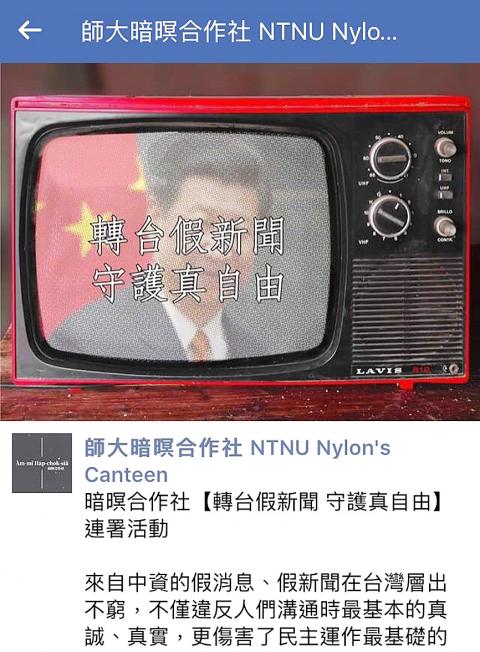National Taiwan Normal University (NTNU) students have joined those from National Taiwan University (NTU) and National Chengchi University (NCCU) in calling for a boycott of CtiTV News over what they call its “fake news coverage.”
The call was made by NTNU’s Nylon’s Canteen, a student group that has about 2,000 followers on Facebook, after NTU and NCCU students earlier this week launched similar campaigns calling for a ban on CtiTV broadcasts on campus.
“There has been incident after incident in which disinformation and fake news were produced by Chinese-funded entities. They have not only violated the basic principles of honesty and genuineness in human communications, but also undermined the principle of trust, which has served as a foundation for democracy,” the group said in an online petition.

Screen grab from Nylon’s Canteen’s Facebook page
The group also criticized communication platforms, such as the Line messaging app, social media sites and news channels, for having “reduced themselves to manufacturers of false information designed to aggravate social division.”
The purpose of the petition, which aims to safeguard “real freedom” by steering away from fake news, is to forge a consensus among NTNU students and faculty before they can issue a collective demand to restaurants on campus and around the school, the group said.
“We encourage the petition participants to take action by switching TV channels,” the group said, adding that it would communicate with restaurants after collecting enough signatures to explain why they refuse to watch news channels that produce “fake news.”
CtiTV News was on Wednesday fined NT$1 million (US$32,441) for failing to adhere to a fact-checking mechanism stipulated in the Satellite Broadcasting Act (衛星廣播電視法).
In January, it was fined NT$200,000 by the National Communications Commission for failing to fact-check its reports about then-Democratic Progressive Party Kaohsiung mayoral candidate Chen Chi-mai’s (陳其邁) rally in Cishan District (旗山) in November last year.
Separately, Shih Hsin University journalism student Tu Kuan-lin (杜冠霖) on Friday launched a similar online petition calling for a boycott of Want Want China Times Media Group (旺旺中時), which owns CtiTV.
Tu accused CtiTV of tarnishing the reputation of journalists.
CtiTV’s failure to practice ethical journalism has made it a negative example for journalism students, Tu said, adding that the channel has hidden behind the banner of “freedom of the press” and paints itself as a victim to avoid making corrections to its news content.
“Does it know no shame?” Tu asked.

MORE VISITORS: The Tourism Administration said that it is seeing positive prospects in its efforts to expand the tourism market in North America and Europe Taiwan has been ranked as the cheapest place in the world to travel to this year, based on a list recommended by NerdWallet. The San Francisco-based personal finance company said that Taiwan topped the list of 16 nations it chose for budget travelers because US tourists do not need visas and travelers can easily have a good meal for less than US$10. A bus ride in Taipei costs just under US$0.50, while subway rides start at US$0.60, the firm said, adding that public transportation in Taiwan is easy to navigate. The firm also called Taiwan a “food lover’s paradise,” citing inexpensive breakfast stalls

TRADE: A mandatory declaration of origin for manufactured goods bound for the US is to take effect on May 7 to block China from exploiting Taiwan’s trade channels All products manufactured in Taiwan and exported to the US must include a signed declaration of origin starting on May 7, the Bureau of Foreign Trade announced yesterday. US President Donald Trump on April 2 imposed a 32 percent tariff on imports from Taiwan, but one week later announced a 90-day pause on its implementation. However, a universal 10 percent tariff was immediately applied to most imports from around the world. On April 12, the Trump administration further exempted computers, smartphones and semiconductors from the new tariffs. In response, President William Lai’s (賴清德) administration has introduced a series of countermeasures to support affected

CROSS-STRAIT: The vast majority of Taiwanese support maintaining the ‘status quo,’ while concern is rising about Beijing’s influence operations More than eight out of 10 Taiwanese reject Beijing’s “one country, two systems” framework for cross-strait relations, according to a survey released by the Mainland Affairs Council (MAC) on Thursday. The MAC’s latest quarterly survey found that 84.4 percent of respondents opposed Beijing’s “one country, two systems” formula for handling cross-strait relations — a figure consistent with past polling. Over the past three years, opposition to the framework has remained high, ranging from a low of 83.6 percent in April 2023 to a peak of 89.6 percent in April last year. In the most recent poll, 82.5 percent also rejected China’s

PLUGGING HOLES: The amendments would bring the legislation in line with systems found in other countries such as Japan and the US, Legislator Chen Kuan-ting said Democratic Progressive Party (DPP) Legislator Chen Kuan-ting (陳冠廷) has proposed amending national security legislation amid a spate of espionage cases. Potential gaps in security vetting procedures for personnel with access to sensitive information prompted him to propose the amendments, which would introduce changes to Article 14 of the Classified National Security Information Protection Act (國家機密保護法), Chen said yesterday. The proposal, which aims to enhance interagency vetting procedures and reduce the risk of classified information leaks, would establish a comprehensive security clearance system in Taiwan, he said. The amendment would require character and loyalty checks for civil servants and intelligence personnel prior to